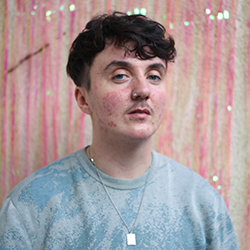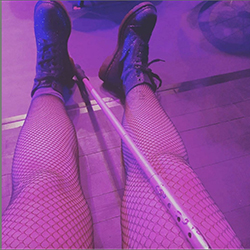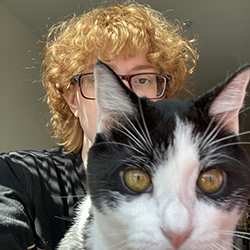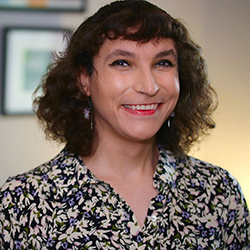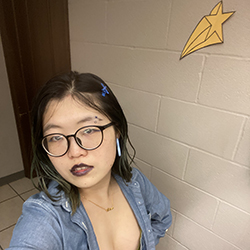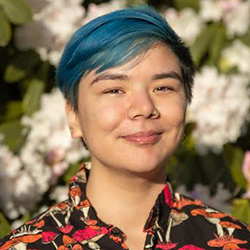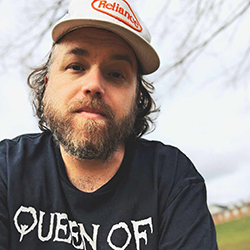supreme
I listened to the same song for 3 days
feeling alone in the woods.
On the fourth day the basement flooded.
I lay towels in the opening
but it’s useless.
Everything rushes in.
I watched your funeral on YouTube
and didn’t cry once
but I cry during Real Housewives of Salt Lake City
when they cry.
Lisa Barlow threw her husband’s rolex
out of the car window and it happened to be
by a Taco Bell.
Grief is soft then hard.
Without a smell or taste.
I am craving a Crunchwrap Supreme
with Diablo sauce.
My shoulder and neck on the left side
have started hurting, like someone
pressing down
and I wonder if that is you
or if I have been carrying myself
all wrong.
supreme
I 3 dagar lyssnade på samma sång
och kände mig ensam i skogen.
På den fjärde dagen översvämmade källaren.
Jag lägger handdukar i öppningen
men det är meningslöst.
Allt rusar in.
Jag kollade på din begravning på YouTube
och grät inte ens en gång
men jag gråter till Real Housewives of Salt Lake City
när dom gråter.
Lisa Barlow slängde sin mans Rolexklocka
genom bilfönstret och det råkade va
vid en Taco Bell.
Sorgen är hård sen mjuk.
Utan lukt eller smak.
Jag vill ha en Crunchwrap Supreme
med Diablosås.
Min axel och nacke på vänstra sidan
har börjat göra ont, som någon
trycker ner
och jag undrar om det är du
eller om jag har hållit mig
helt fel.
dandelions
The new cat climbs the window screen
and peers inside.
Little skywalker
shitting on the steps.
I move the litter box
around all day
but she’s not interested
in my kind of society.
*
Dad wearing a bicycle helmet
and backpack.
We are going fast around a lake.
Me on the seat behind him.
Some kind of race.
He hands me cold mamma scans
meatballs,
reaching behind
to entertain me.
*
It’s easy to forget how to be a person.
It’s easy to become someone else.
I’m watching a man with face tattoos
make a dandelion sandwich on my phone.
*
The summer was a blur and fall broke
into many pieces. A song.
Imperfect shards.
Every time I blink it takes a screenshot
and stores it,
like now,
like now
*
Did you know
it is illegal in some states
to collect rain without a permit?
I confess, Mr Rain police.
In my defense
it was raining hard, so hard,
all night.
What was I supposed to do?
*
While I’m confessing:
I’m jealous of the cats,
even that one
scratching up my arm
when I pet wrong.
The new one,
the crooked old one,
all of the past and present cats,
their papers
in order, their passion
to nap
the day away.
*
How much grief
to fill a human body?
How many
birds? Blue herons
or sparrows?
Be specific.
How many leaky rain barrels
of moldy yesterday tears,
approximately?
*
I like to think of him young
at the racetrack,
cool and in love,
moving quickly
with purpose,
picking up cigarette butts
and relighting them.
*
She’s resting now
on both paws
in the small cake-slice window
of wild sunlight.
maskroser
Den nya katten klättrar på fönsterskyddet
och tittar in.
Lilla skywalker
skiter på trappan.
Jag flyttar runt kattlådan
hela dagen
men hon är inte intresserad
av min typ av samhälle.
*
Pappa har cykelhjälm
och ryggsäck.
Vi åker fort kring en sjö.
Jag i sätet bakom.
Nåt sorts lopp.
Han ger mig kalla mamma scans
köttbullar,
sträcker sig tillbaka
för att underhålla mig.
*
Det är lätt att glömma hur man ska va en person.
Det är lätt att bli nån annan.
Jag kollar på en man med ansiktstatueringar
som gör en maskrosmacka på min telefon.
*
Sommaren var suddig och hösten brast
i många bitar. En sång.
Operfekta skärvor.
Varje gång jag blinkar tar den en skärmdump
och sparar den,
som nu,
som nu
*
Visste du att
det är olagligt i vissa stater
att samla regnvatten utan tillstånd?
Jag erkänner, herr regnpolis.
I mitt försvar:
det regnade så hårt, så hårt,
hela natten.
Vad skulle jag göra?
*
Medans jag erkänner:
Jag är avundsjuk på katterna,
till och med den
som river upp min arm
när jag stryker fel.
Den nya,
den gamla krokiga,
alla katter från förr och nu,
deras papper
i ordning, deras passion
for att sova
dagen bort.
*
Hur mycket sorg
för att fylla en människokropp?
Hur många
fåglar? Blåhäger eller
sparvar?
Va exakt.
Hur många läckande regntunnor
med möglig igårgråt,
ungefär?
*
Jag gillar att tänka på honom ung,
på travet,
cool och kär,
snabba och meningsfulla
rörelser,
plockar upp cigarettfimpar
och tänder igen.
*
Nu sover na
på båda tassarna
i det lilla tårtbitsfönstret
av vilt solsken.
Kim Göransson (they) is from Sweden but live in VA with their family. They like to bake, make playlists, and get lost in nature. They like tinned fish, brie, sad movies, and pro wrestling. Shinsuke Nakamura fan. Editing for Superfan Zine and Meow Meow Pow Pow lit. You can find them @sonofgore on instagram.
